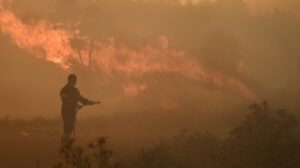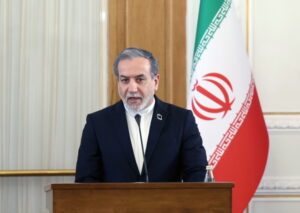The Bloomberg agency in an analysis presented Greece‘s handling of this year’s fires.
As noted, Greece’s main weapons this difficult summer have been drones and the “112” emergency number helping to deal with forest fires, although more fires have broken out in recent years due to the climate crisis.
The agency notes that forest fires have always affected Greece, but now they have become a staple of summer across southern Europe as climate change creates more extreme weather. Greece is experiencing its worst fire season in two decades, facing some 4,000 fires since May 1. While that’s double the number compared with the same period last year, the death toll is much lower, with only one victim, Bloomberg notes.
As an example, the international medium cites the fire that broke out in the Barnabas region on August 11, noting that “thanks to drones, a helicopter dropped water within 5 minutes of the fire starting. The first fire truck was there within 7 minutes, according to authorities. Eventually, more than 700 firefighters, dozens of planes and helicopters and about 200 vehicles were deployed.”
Bloomberg also quotes the testimony of a group of young people who were dining in an area northeast of Athens when the fire broke out and for whom the “112” number proved, they say, to be a lifesaver: “it’s much better to get an alert, miss your meal and walk away than to run the risk of being trapped in a fire.”
The publication also details the extensive precautionary measures taken by the Greek government to address the risk of wildfires.
In the last five years, Greece has increased the number of planes and helicopters for firefighting to 89 from 61. The “112” emergency number became operational as soon as Prime Minister Kyriakos Mitsotakis took power in 2019, Bloomberg notes, adding that in August the government announced €4.3 billion in measures to combat the effects of climate change, with some initiatives aimed at protecting forests and reducing fire risks.
According to Bloomberg, this comes after a €2.1 billion procurement package unveiled in April that included amphibious aircraft, drones for aerial surveillance and other fire detection and firefighting systems.
Typical, the agency says, is the Greek Prime Minister’s statement from August 14: “We do not expect the solution to come out of nowhere,” he said at the time, adding that “the work that needs to be done in the field of prevention is very important. I think we have laid some important first foundations in that direction.”
Bloomberg also cites other measures taken by Greek authorities that demonstrate their determination to tackle the fires: tightening laws on arson, as well as a change in the law, now requiring private landowners to clear their plots of flammable dry vegetation and submit electronic declarations to the authorities.
Ask me anything
Explore related questions





